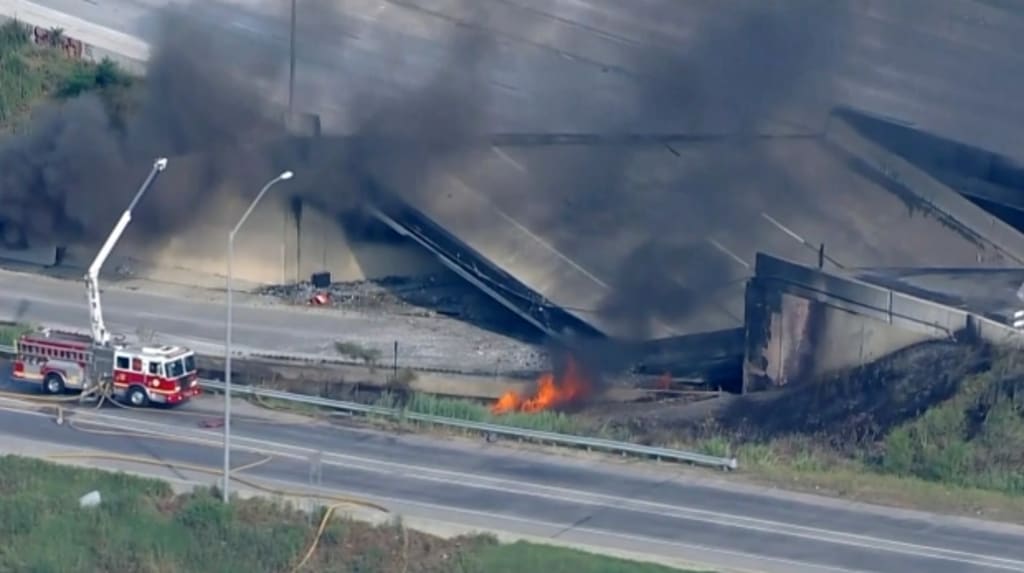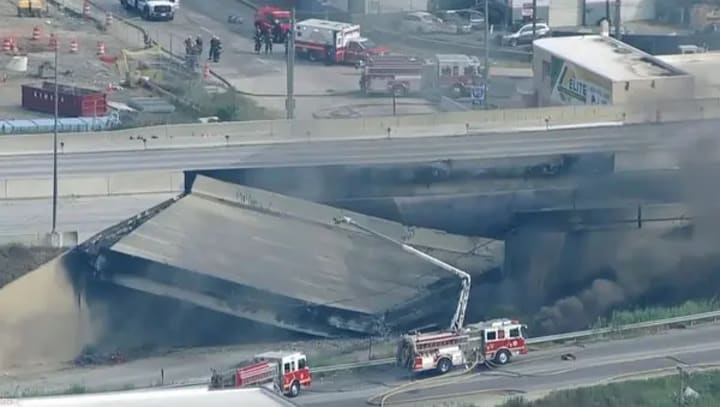Tanker Truck Fire Causes Interstate Overpass Collapse in Philadelphia
Rebuilding Resilience: Overpass Collapse Sparks Urgency for Infrastructure Investment

Residents in the northeastern United States are bracing themselves for a chaotic morning commute as a result of a devastating incident that occurred on Sunday. A tanker truck carrying gasoline caught fire, leading to the collapse of an overpass on Interstate 95 in Philadelphia. The collapse has prompted the closure of the major highway in both directions and is expected to cause significant disruption for several months during the rebuilding process.
The exact cause of the tanker truck fire remains unclear at this time. Fortunately, there have been no reports of casualties or injuries as a result of the incident. Nevertheless, the aftermath of the collapse has left transportation authorities grappling with the immense task of reconstructing a critical stretch of the main north-south interstate on the East Coast.
Leslie Richards, the chief executive officer of the Southeastern Pennsylvania Transportation Authority, expressed the need for patience during this challenging period. Speaking at a press conference on Sunday, Richards acknowledged the inconvenience the closure would cause to commuters and urged residents to explore alternative routes, utilize commuter trains, or even consider working remotely if possible.
Recognizing the urgency of the situation, Pennsylvania Governor Josh Shapiro announced his plans to declare a state of disaster on Monday. This declaration will unlock federal funding that can be used to support the reconstruction efforts for the section of the highway that witnesses a staggering daily traffic volume of 160,000 vehicles. Rebuilding such a vital transportation artery will undoubtedly be a significant undertaking, requiring careful planning and execution.
The U.S. National Transportation Safety Board (NTSB) has dispatched a team to investigate the incident. Preliminary findings indicate that the tanker truck was carrying gasoline, leading to concerns about the impact of intense heat on the structural integrity of the overpass. Andy Herrmann, a former president of the American Society of Civil Engineers, explained that bridges are not designed to withstand the extreme temperatures that can be generated by a tanker truck fire, which can reach upwards of 2,000 degrees Fahrenheit. While such incidents are uncommon, they raise questions about the need to reassess bridge design requirements.

H2: Evaluating Bridge Design Standards
The collapse of the overpass in Philadelphia has reignited discussions surrounding bridge design standards. Andy Herrmann suggests that it may be necessary to reconsider existing requirements, given the potential vulnerability of bridges to intense heat from accidents involving flammable cargo. However, the scale of upgrades required across the vast number of overpasses in the United States poses a significant challenge.
Maintaining the basic safety of deteriorating bridges is already a considerable task. Therefore, implementing comprehensive changes to address the newfound concerns would require substantial financial resources. Despite the potential benefits, the feasibility of such a large-scale upgrade remains uncertain.
In the wake of this incident, transportation authorities and experts will undoubtedly intensify their efforts to prevent similar accidents in the future. The focus will likely be on improving safety protocols and exploring innovative solutions that strike a balance between cost-effectiveness and enhanced resilience.
As the community copes with the disruption caused by the closure of Interstate 95, it is crucial for residents to heed the advice of local authorities. By exploring alternative transportation options and exercising patience during the long and arduous rebuilding process, commuters can contribute to minimizing the inconvenience and ensuring a smoother transition back to normalcy.
Furthermore, the collapse of the overpass highlights the need for continued vigilance in monitoring and maintaining critical infrastructure. Regular inspections and timely repairs are essential to prevent the deterioration of bridges and ensure the safety of motorists and pedestrians.
In light of this incident, transportation officials and engineers may also explore new technologies and materials that can better withstand extreme heat and improve the resilience of bridges. Research and development in this area could lead to groundbreaking advancements in bridge design, making them more resistant to unforeseen accidents and disasters.
Local communities and businesses in the affected areas are likely to face significant challenges during the prolonged closure of Interstate 95. The impact on commerce and daily life cannot be understated. However, the incident also presents an opportunity for community solidarity and resilience as neighbors come together to support one another during this trying time.
Government agencies, including the Pennsylvania Department of Transportation, are expected to provide regular updates on the progress of the reconstruction efforts. Transparency and clear communication will be crucial in keeping residents informed about the timeline for reopening the affected section of the interstate.
In conclusion, the collapse of the overpass on Interstate 95 in Philadelphia following a tanker truck fire has brought attention to the vulnerability of bridges to extreme heat. While the incident has caused significant disruption to daily commutes and transportation, it also serves as a reminder of the importance of maintaining and improving critical infrastructure across the country.
As authorities work diligently to rebuild the collapsed overpass, it is essential for residents and commuters to remain patient and explore alternative routes. Adhering to the guidance of transportation officials and considering flexible work arrangements can help alleviate some of the challenges posed by the closure.
This incident should prompt a broader conversation about bridge design standards and the need for ongoing investments in infrastructure resilience. By addressing these issues, transportation authorities can enhance the safety and longevity of vital road networks, ensuring smoother and more secure journeys for all.
The collapse of the overpass on Interstate 95 in Philadelphia has not only disrupted daily commutes but also raised concerns about the overall state of infrastructure across the United States. The incident serves as a wake-up call, highlighting the need for increased investments in maintaining and improving critical transportation networks.
Experts and engineers are closely examining the incident to identify potential design flaws and vulnerabilities in bridge structures. By learning from this unfortunate event, they aim to develop more robust and resilient infrastructure systems that can withstand unforeseen accidents and natural disasters.
In the coming months, the reconstruction process will be a challenging endeavor. Transportation authorities will need to work efficiently to minimize the impact on daily commuters while ensuring that the rebuilding process meets the highest safety standards. The collaboration between federal, state, and local agencies, as well as private contractors, will be crucial in expediting the reconstruction process.
As the affected section of Interstate 95 remains closed, commuters are encouraged to explore alternative transportation options. Utilizing public transportation, carpooling, or adjusting work schedules to avoid peak commuting hours can help alleviate congestion on alternative routes.
Businesses operating in the vicinity of the closure should consider implementing remote work arrangements or flexible schedules for their employees. This proactive approach can mitigate the disruption to business operations and help maintain productivity during this challenging period.
While the reconstruction efforts may cause inconvenience in the short term, the long-term benefits are significant. A rebuilt and reinforced overpass will ensure safer and more efficient travel for commuters, while also bolstering the resilience of the transportation infrastructure in the region.
In the aftermath of this incident, policymakers at the local, state, and federal levels should prioritize infrastructure investments. By allocating adequate resources to maintenance and upgrades, the country can prevent similar incidents from occurring in the future and ensure the safety of its citizens.
Moreover, this incident highlights the importance of emergency preparedness and response capabilities. Local emergency management agencies, along with law enforcement and fire departments, demonstrated their prompt and efficient response to the situation. Their efforts ensured that no lives were lost, and the incident was swiftly contained. Recognizing their contributions and continuing to invest in emergency preparedness measures will further strengthen the resilience of communities.
As the community rallies together during this challenging time, it is essential for residents to stay informed through official channels for updates on the progress of the reconstruction. Adhering to traffic advisories and following the guidance of transportation authorities will help minimize delays and facilitate smoother travel once the overpass is reopened.
The collapse of the overpass on Interstate 95 serves as a reminder of the importance of regular infrastructure assessments, maintenance, and investments. By prioritizing the safety and efficiency of transportation networks, the nation can ensure a resilient and sustainable future for its citizens.
About the Creator
Ranjan Kumar Pradhan
Unleash your curiosity and dive into a realm of captivating wonders. Join me on a journey of knowledge, inspiration, and thought-provoking insights. Let's embark on an extraordinary adventure together.





Comments
There are no comments for this story
Be the first to respond and start the conversation.